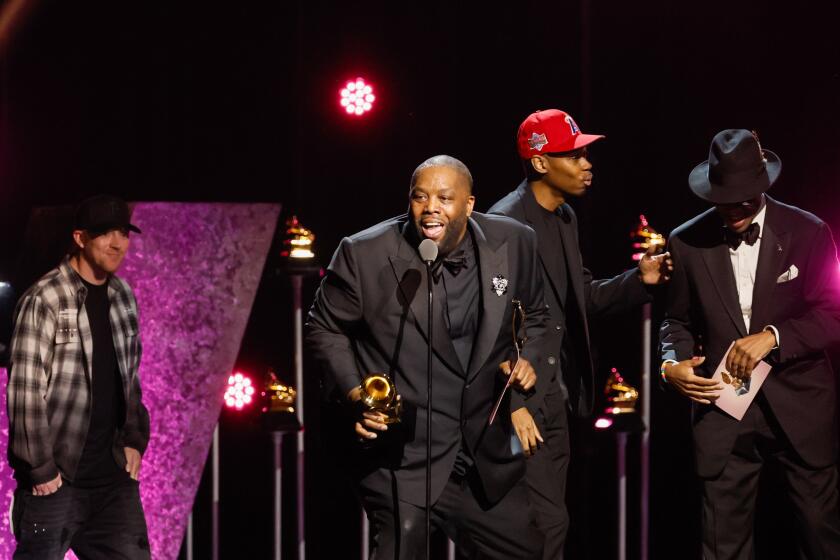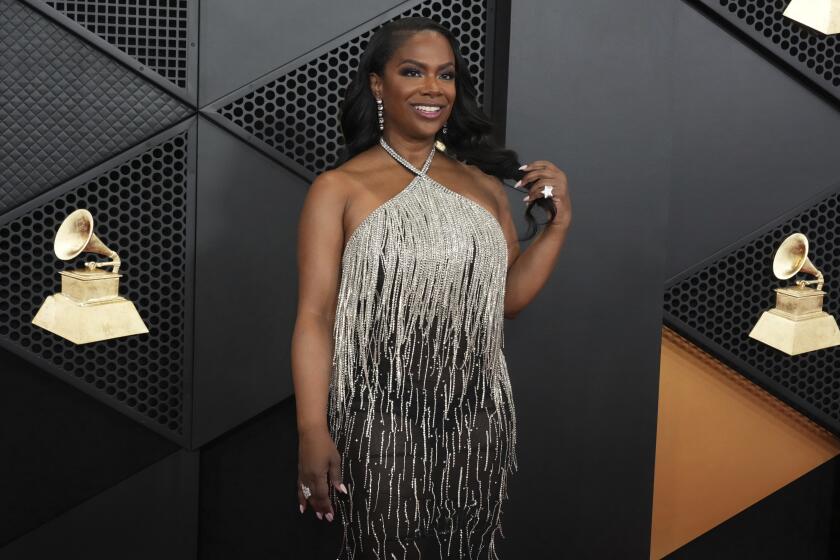Kings of Leon: Pop’s unlikely royal family is back at the Grammys
Caleb Followill will be trembling in his black leather ankle boots when the Record of the Year prize is announced tonight at the Grammy Awards. “Use Somebody,” the hugely popular power ballad by Kings of Leon, is nominated in that category and three others. That gives the 28-year-old singer, songwriter and guitarist four chances to get up on stage and choke.
“Our family gets to see it. That’s the only reason I go to the Grammys,” said Followill during a wine-soaked interview at Giovanni Ristorante, across the street from his recently purchased Nashville luxury apartment, a week before the awards ceremony.
Family is important to Followill; the other members of the Kings are his older brother Nathan on drums, his younger brother Jared on bass and his cousin Matthew on guitar. “The Grammys are a scary place for me. I fight panic attacks, so it’s not a fun time for me. If we win and we have to go up there and talk I probably won’t say a word. I won’t be able to.”
Followill is given to declarations like this one, somehow both modest and a bit overblown. They complement his persona, which persuasively melds the hedonistic bravado of macho guitar slingers with the insecurities of sensitive indie-rock types.
Kings of Leon has become the emblematic band of the new decade by resurrecting the sound and spirit of rock’s classic era for a generation that doesn’t view the music as necessarily heroic or transformative. Combining the blues strut of the Rolling Stones with the jitters of post- punk bands like Joy Division and, more recently, the reach of U2, the Kings of Leon do what great pop does -- they transcend any specific root or subculture to make something universal. And “Use Somebody,” with its churchy chorus and what Caleb calls its “double meaning” of mercenary lust melting into loneliness and soul hunger, was a perfect anthem for a troubled year like 2009.
Taylor Swift, Beyoncé and Lady Gaga might wind up trumping the Kings for Grammy statues, but “Use Somebody” stands as a song that’s crossed borders and made many unlikely fans. It’s one of only four rock songs in recent history to top four Billboard charts at once, including the mainstream and alternative Top 40 tallies. No less than Jay-Z called it his favorite song of last year in a recent Village Voice interview, saying it was rivaled in his book only by the Kings’ more carnal but equally lofty “Sex on Fire” (which last year earned the Grammy for best rock performance by a duo or group with vocals).
Artists can’t stop covering “Use Somebody.” Nick Jonas and Nickelback both perform it in concert; English soul songbird Pixie Lott, avant-pop chanteuse Natasha Khan ( Bat for Lashes) and Jay-Z protégé Bridget Kelly have recorded it; Nashville emo band Paramore scored a YouTube hit after performing it live for the BBC.
“It was a perfect song for us to cover because I enjoy singing anything that’s soulful,” said Paramore’s lead singer, Hayley Williams, in an e-mail. “All Caleb’s vocal lines are extremely soulful. It could almost be any genre. And that versatility really shined when we were able to strip the song down acoustically. It didn’t affect the power of the lyrics or anything because good art is good art no matter how someone translates it.”
All this praise makes Caleb Followill uncomfortable. He’s recently taken to telling journalists that he wants to “shoot himself in the head” when he hears “Use Somebody” -- he’s sick of it and prefers to listen to late Texas troubadours like Townes Van Zandt and Blaze Foley, whom he claims as a current main influence. Yet he admits that he hit on something special when he followed through on the phrase he first uttered to his siblings on a desolate night during a long tour.
“It’s kind of a hook,” he said. “When you see it on paper and you think, it’s Kings of Leon, he’s going to be talking about some one-night thing. But really it’s just the opposite of that. At the end of the day no matter who you are, you’re gonna have those moments when you need someone to help you out.”
Becoming the Kings
Kings of Leon had a story before they were a band, and it took some time for the group to make music that lived up to it.
Raised on the road by a traveling Pentecostal preacher and his home-schooling wife, Caleb and his older brother Nathan, 30, weren’t allowed to indulge in much popular culture as kids -- only the occasional Stones or Neil Young cassette that their dad played while driving. “When you grow up in the back seat of a car, the window is your television,” said Caleb. “It was just about, where do you want to go with your mind?”
The land of pretend gave way to musical collaboration when the Followills’ parents divorced and the family settled down outside of Nashville. Nathan Followill, who spoke in a separate interview at his house nestled in the trees above the Music City, said that the road seemed obvious then.
“[Caleb and I] were working in the mall, and this guy came in talking about how he had just got a publishing deal for $15,000. We were making $5.50 an hour, and we thought, we could live for a year off of that! And he would play us his music, and it was horrible! We used to sing in church, and . . . so we just started writing. I was in college, Caleb and them were living in another town, and I would go home on the weekends and we would write just silly, bubblegum stuff.”
Being in Nashville seemed like fate to the elder Followill. “It’s the songwriting capital of the world, so we were like, ‘It’s a sign,’ ” continued Nathan, who’s as frank and enthusiastic as his brother is emotional. “This is our sign. We’re gonna go out there and we’re just gonna get a record deal, you know. We’re going to get like the biggest publishing deal ever.”
Instead, the Followills met the powerhouse manager Ken Levitan, who helped convince them that rock, not country or pop songwriting, was their best natural fit. They also started working with songwriter Angelo Petraglia, who’d spent time in Boston’s lively New Wave scene in the 1980s before relocating to Nashville. He became a mentor.
“Caleb and Nathan were doing a much different thing when I met them,” said Petraglia in a phone interview. “I was hearing them as this Southern soul Everly Brothers. They shared a lead vocal. They had the sibling harmony, and it wasn’t a rock band. It was a duo, and they just knew how to sing together. I turned them on to ‘Exile on Main Street’ and the Velvet Underground and the Clash, and they were like, ‘Wow.’ ”
The two twentysomething Followills enlisted their teen kin, assigning Jared the bass and “kidnapping” Matthew to play guitar. From those early days onward, Kings of Leon grew up in public, developing their style in front of an audience -- especially in England, where the four handsome boys were quickly labeled “the Southern Strokes” and became a sensation.
“It was survival of the fittest for the first two records,” said Nathan. “Now we’re to the point where we’re a lot more comfortable with our instruments. We kind of feed off of each other, so I think that for every bit of nervousness we have, we’ve got twice as much excitement, just because we’re honing our skills, we’re better musicians. We’re in the best musical shape of our lives right now.”
Finding their sound
Like many notable bands, especially post-punk acts, Kings of Leon relied on accident to develop their sound. Matthew Followill has grown into an impressive guitarist, especially after spending time in the presence of the Edge when the band toured with U2 in 2005. But none of the Kings are preening virtuosos. Overcoming ineptitude helped them figure out who they are.
“When we started out, Jared was not a great bass player,” Caleb said of his youngest brother, who was 14 when he joined the Kings. “He started listening to Led Zeppelin and playing guitar parts on the bass. I saw that and said, ‘Well, then I better play to the beat’ -- I always play to the beat, because I used to drum . . . So I was playing bass on guitar, Jared was playing guitar on the bass, and Matthew, who can rip, I think at times he started to think, there’s the guitar, there’s the bass, let me make some sounds. And so it’s all rearranged, but it all falls into place.”
This unusual instrumentation was anchored by Nathan’s strong but quietly funky drumming style, which he learned in church. “Black gospel would be the most influential,” he said. “Services where you go in and the music takes over. There’s no preaching, there’s no nothing -- it just turns into a three-hour jam.”
Caleb also spoke of the influence of black churches on his family’s musical development. “I never liked Southern rock; I was never a huge Skynyrd or Allman Brothers fan,” he said. “As a kid growing up in the South, I didn’t feel the need to listen to someone I knew was from the South. I kind of wanted to abstain, because the people I listened to who were from the South were black people.”
In the older Followills’ minds, music is always channeled through a “stomp-clap” church beat. The band’s younger members brought in the more current sounds they heard in high school; Jared’s iPod is still a big source of inspiration for the group.
“We are a true band,” said Caleb. “I’m writing a song that sounds like old country and western music; Nathan might be playing a church beat. Jared is playing a very modern bass line. Matthew is over there, tinkering with pedals and making weird sounds.”
The result is less a throwback than a dance on a Mobius strip. The Followills learned rock’s foundation -- the blues and gospel -- at the source, but by the time they got to it, the worshipers jamming in church had themselves been influenced by the likes of the Rolling Stones. They discovered cutting-edge rock by woodshedding in country music’s capital city. No wonder their hits are loved by fellow artists across genre lines; without meaning to, they’ve connected it all.
Caleb Followill might be worried about what comes next -- he’s threatening to write that hard country record, in part so that he won’t have to worry about the fallout from any more megahits. But Nathan Followill’s fairly sure that he and his band of brothers have found their niche.
“We’re pop music,” he said. “That’s popular. It stands for popular.”
It’s a label that fits Kings of Leon to a well-worn T.
More to Read
The biggest entertainment stories
Get our big stories about Hollywood, film, television, music, arts, culture and more right in your inbox as soon as they publish.
You may occasionally receive promotional content from the Los Angeles Times.






